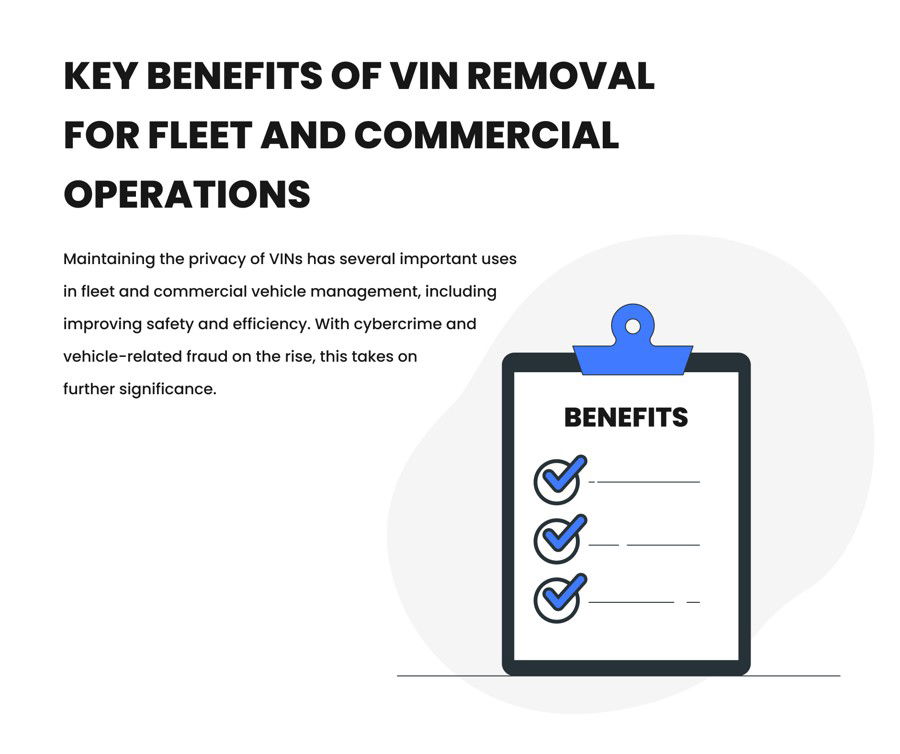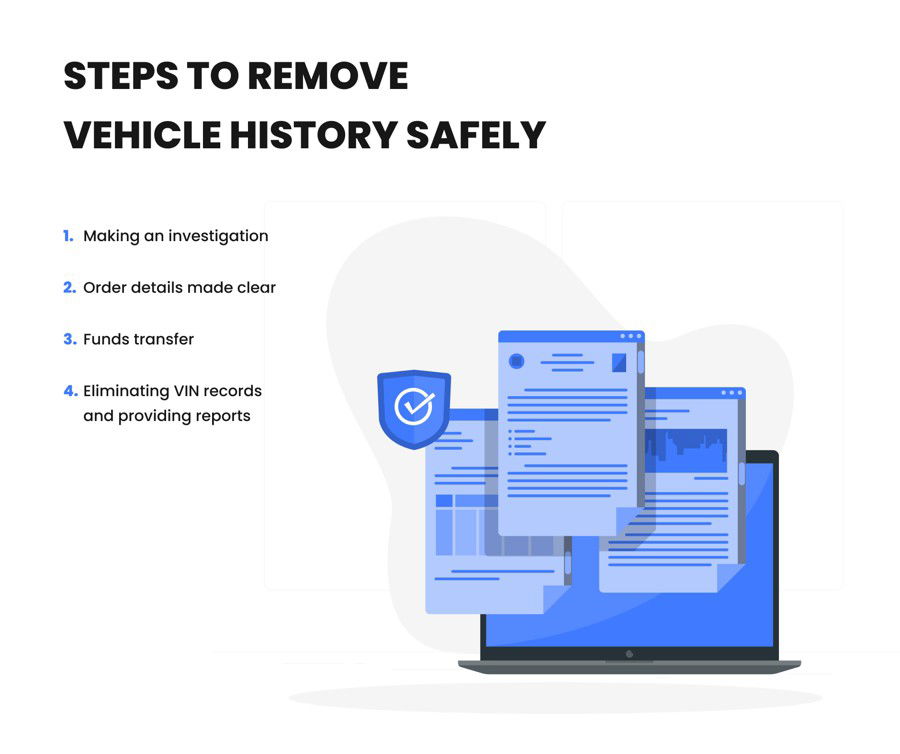This article outlines why and how to delete VIN history at Bidfax to avoid identity theft. Data security is of utmost importance and you should learn about the dangers of disclosing your VIN and how to minimize them.
The Role of VINs in Fleet and Commercial Vehicle Management
Vehicle identification numbers are essential in the administration of fleets and commercial vehicles. To see the service history of each vehicle and plan for future maintenance, fleet managers utilize VINs. This lets you keep tabs on your cars' technical status and do inspections and repairs when they're due, which means less running expenses and more road safety.
Ad
Furthermore, VINs are used by manufacturers to identify particular cars that need software updates or repairs when recalls are implemented. To limit downtime and eliminate possible economic concerns, it is crucial to rapidly identify and segregate cars that are subject to recalls, which is particularly significant for big fleets.
Accurate and effective monitoring of each vehicle, compliance, and operational streamlining are all made possible with VINs in fleet management. Thus, VIN becomes an essential instrument for enhancing the efficacy and security of commercial transportation.
How the Vehicle Identification Number Tracks Vehicle History
From manufacturing to registration, ownership transfers, accidents, repairs, and recalls, a vehicle's VIN records its history. Interested parties may acquire a complete report on the vehicle's history, including accidents, maintenance, and ownership changes, using the VIN. Thanks to this transparency, the buyer may assess the car's condition and value. VIN is a safety feature that provides important data for keeping the vehicle secure.
Common Reasons for Removing Vehicle History from Public Databases
The second hand automobile market depreciates 20.4%, with electric cars depreciating 30%. How to sell a used automobile and enhance your chances of closing? Delete vehicle history from public databases to secure your personal information and driving record and increase the car's resale value.
While having access to a vehicle's history is typically advantageous, there are occasions when an owner would consider eliminating or restricting this information in public databases:
• Owners may prefer to preserve personal information associated with the car, such as prior residences or sensitive transaction data.
• If the vehicle history includes errors, like inaccurate accident reports or maintenance records, removing or modifying this information helps avoid misunderstandings and significant depreciation of the car's value.
• For cars that have been repaired or restored after major damage, owners may desire to remove salvage titles or negative histories to represent the current state appropriately.
• High-profile persons or corporations may delete car details to avoid monitoring or being targeted by harmful parties.
• In some legal scenarios, such as witness protection programs or secret settlements, deleting vehicle history from public view may be essential.
It's crucial to handle the erasure of car history with prudence. While it may provide advantages like better privacy or improved resale value, it may also create ethical and legal problems. Owners should contact legal specialists and follow all local rules and regulations before trying to erase or edit car history information.
Key Benefits of VIN Removal for Fleet and Commercial Operations

Maintaining the privacy of VINs has several important uses in fleet and commercial vehicle management, including improving safety and efficiency. With cybercrime and vehicle-related fraud on the rise, this takes on further significance.
Ad
Recently, VIN fraud has increased, according to the NICB. Over one million cars were stolen in the United States in 2023, up over 1% from 1,008,756 in 2022 to 1,020,729 in 2023. Illegal acts such as VIN cloning and identity theft may have a detrimental effect on a company's image and bottom line.
Enhanced Privacy for Company Vehicles and Drivers
The confidentiality of business cars and their drivers may be better ensured with the protection of VIN information. Businesses may protect customer data, maintenance records, and car specs by reducing the amount of time VINs are exposed. Pay close attention to this because:
• By encrypting VINs, we can stop anybody from getting their hands on sensitive information like drivers' whereabouts, schedules, or personal details.
• You may stay ahead of the competition by protecting your company's operations, vehicle capabilities, and logistical tactics by keeping your fleet specifics secret.
• Companies may remain in compliance with data protection legislation by following privacy standards and protecting driver and vehicle information.
A safety plan and effective fleet management cannot be complete without safeguarding VIN information. Companies can ensure the safety of their drivers and cars while also strengthening their market position and complying with data privacy regulations by restricting access to this data.
Reducing Risks Associated with Search Engines and VIN History
Public access to VIN histories can expose companies to a variety of risks. By managing and limiting the availability of this information, fleet operators can reduce:
1. Possible fraud: Cloning and other forms of abuse of vehicle identification may be prevented by limiting access to VINs.
2. Targeted theft: The extensive fleet information provided by VIN protection lessens the possibility that cars would be targeted for theft or damage.
3. Search Engine Abuse: Control over VIN data prevents unwanted access to critical information via simple web searches.
4. Legal considerations: VIN data management keeps information correct, preventing confusion or problems caused by out-of-date information.
Thus, effective protection of VIN information enables companies to improve security, reduce risk, and preserve the integrity of their operations.
When VIN Removal Is a Practical Choice for Fleet Owners
Owners of fleets have the option to remove or limit access to vehicle identification numbers in certain situations:
• Protecting business information: Competitors cannot access fleet details if the VIN is hidden.
• Boosting safety: Lessening opportunities for fraud and theft, VIN restrictions are a smart move.
• Eradicating inaccuracies: Keeping records accurate requires the removal of inaccurate or outdated information.
• Preserving confidentiality: Complying with data protection rules is facilitated by controlling who has access to VINs.
• Sale or disposal: Vehicles with a clean VIN history are more appealing to potential purchasers or those looking to dispose of them.
Ad
It is crucial to operate lawfully, consult professionals, and keep the appropriate connection with authorities.
Steps to Remove Vehicle History Safely

Using professional services to remove vehicle history is an easy, safe, and quick operation. It guarantees dependable outcomes and full client satisfaction by following a straightforward, step-by-step strategy. Allow me to explain:
1. Making an investigation. A request to HideAutoVin must be submitted as the first step. Customers initiate the process for expert analysis and action by providing basic information about their requirements.
2. Order details made clear. After receiving the request, a team member will contact the customer to address any issues. This is the first step in providing proper service execution by making sure we grasp the client's needs completely.
3. Funds transfer. The client goes ahead and pays after all the details are verified. When you complete this step, the service will be secured and the experts will be able to remove your vehicle's history.
4. Eliminating VIN records and providing reports. Removing the vehicle's history securely is the last stage. A comprehensive report verifying the work done and guaranteeing full transparency is sent to the client when the procedure is finished.
Customers may have faith in HideAutoVin since they manage every stage professionally, guaranteeing dependability, safety, and peace of mind.
Conclusion
Theft of personal information is commonplace, making VIN protection all the more important. Hide or delete your VIN history to safeguard your privacy and security. Scammers, identity thieves, and those who would clone your automobile may all benefit from this.
Keep your vehicle identification number hidden from would-be thieves; it's necessary for essential services like registration and maintenance. Simple precautions, such as utilizing VIN covers, covering windows, and securing automobile paperwork, may greatly reduce the risk of identity theft.
By monitoring the ease of access to your VIN, you take responsibility for your vehicle's security. Avoid making a hasty decision. Immediate action is required to safeguard both you and your vehicle from emerging dangers.





— Comentarios0
Se el primero en comentar